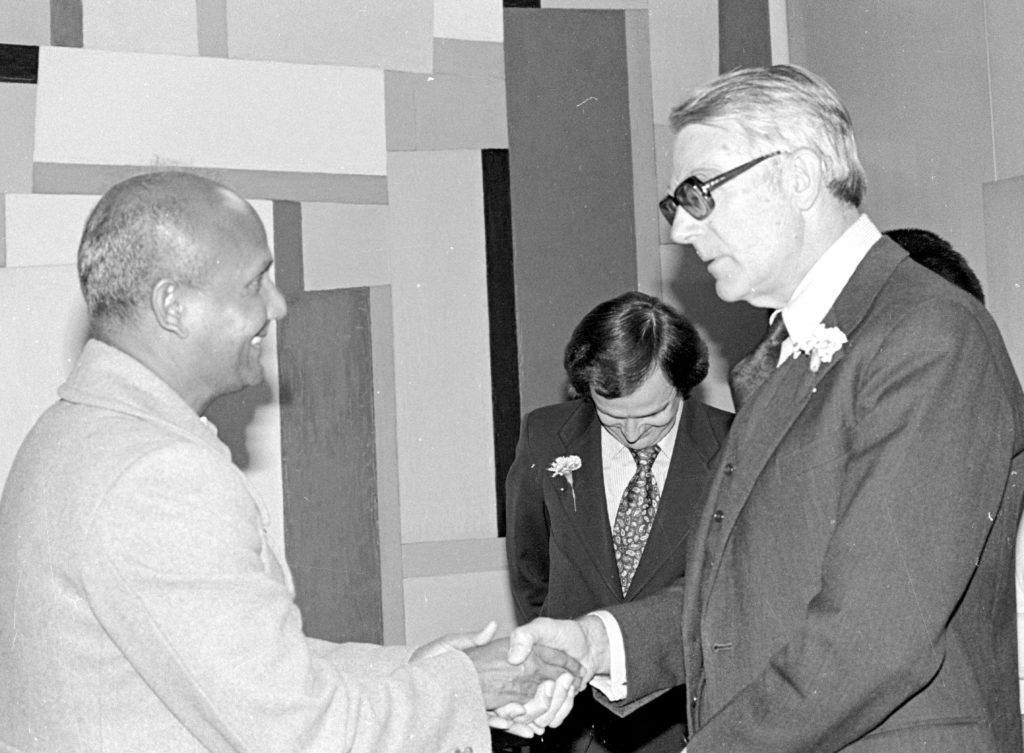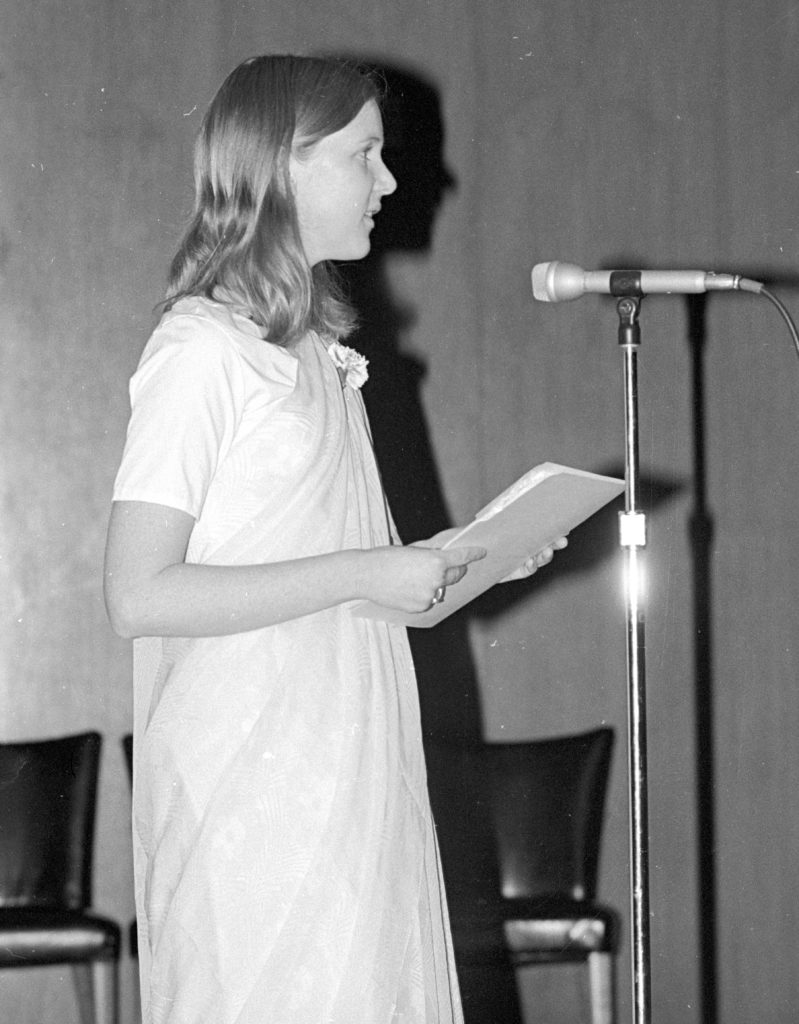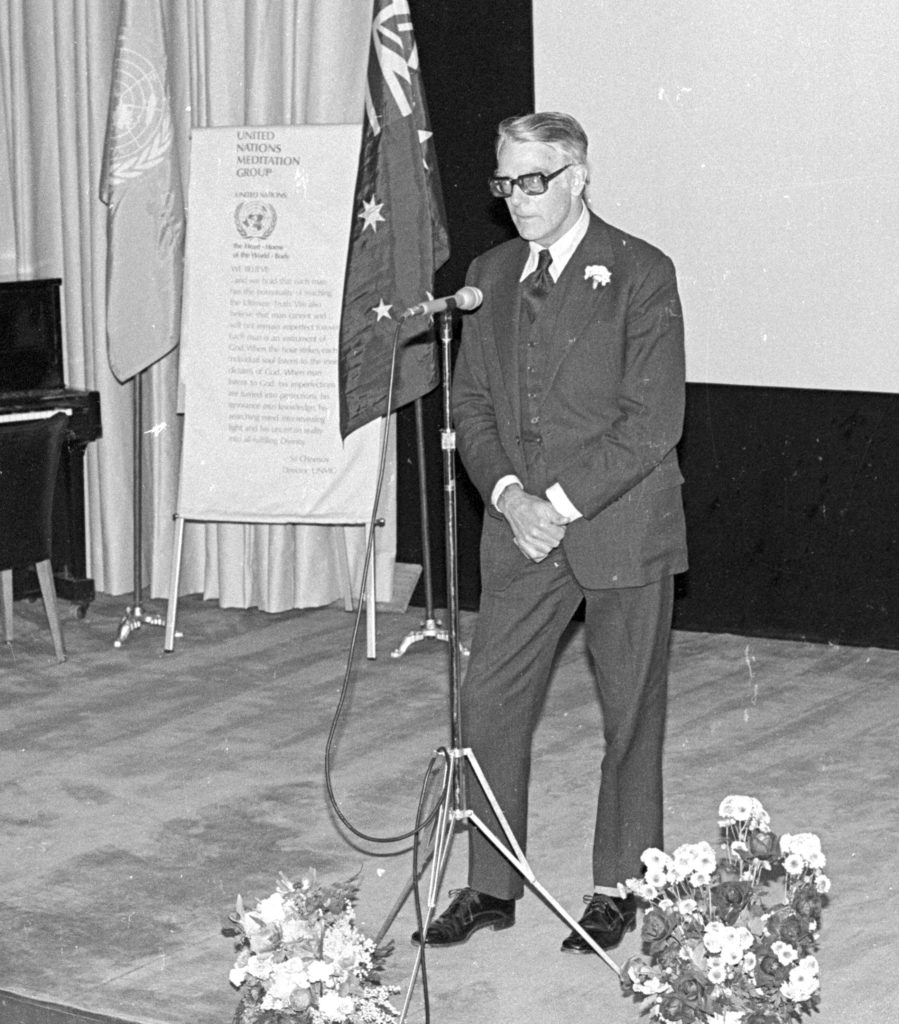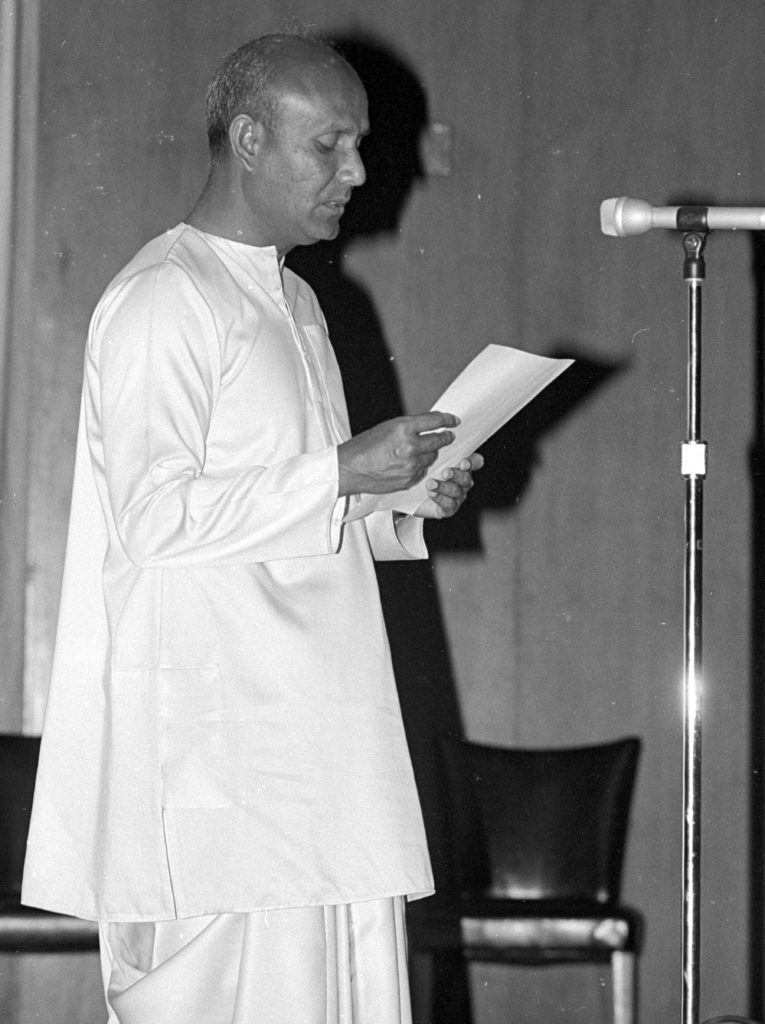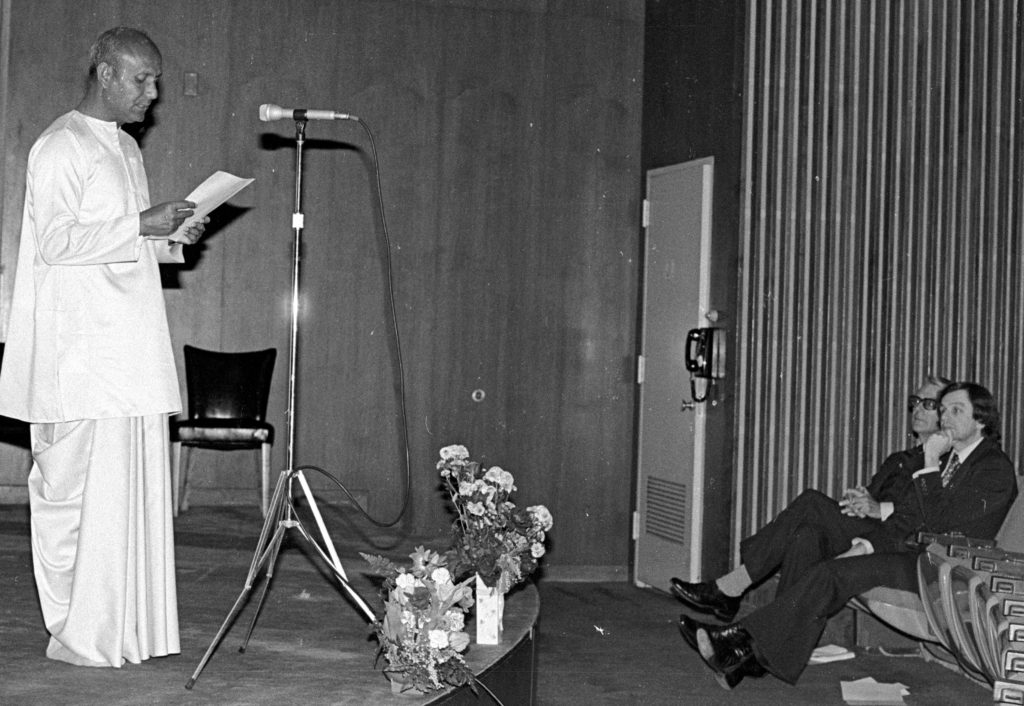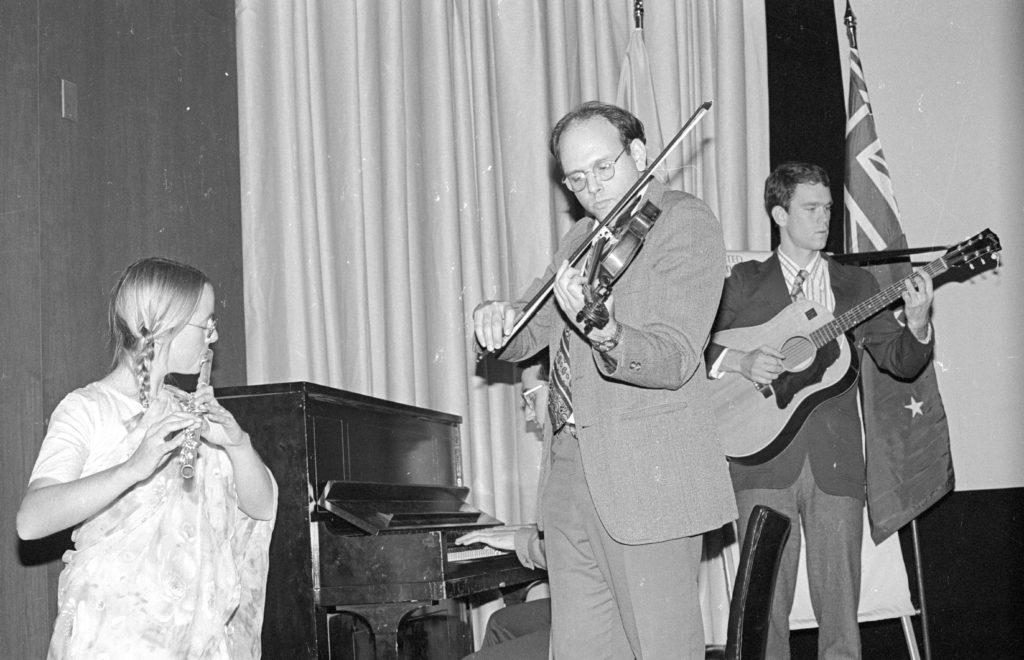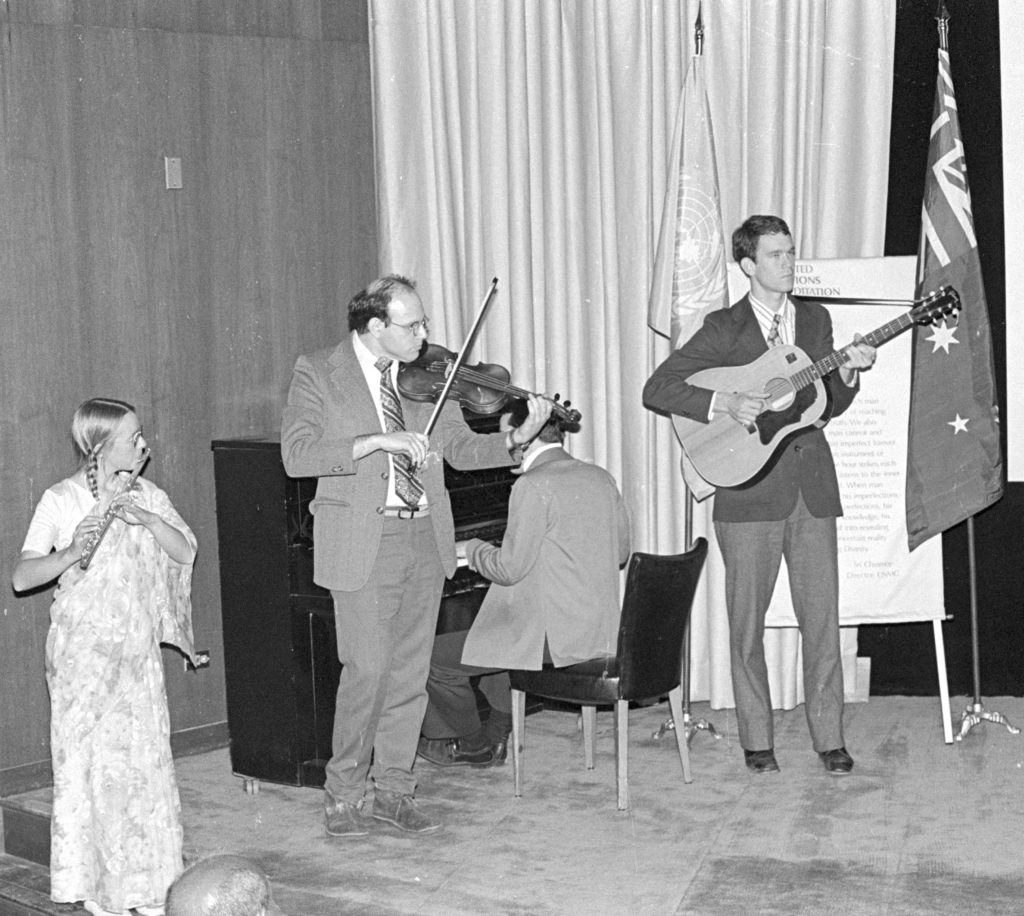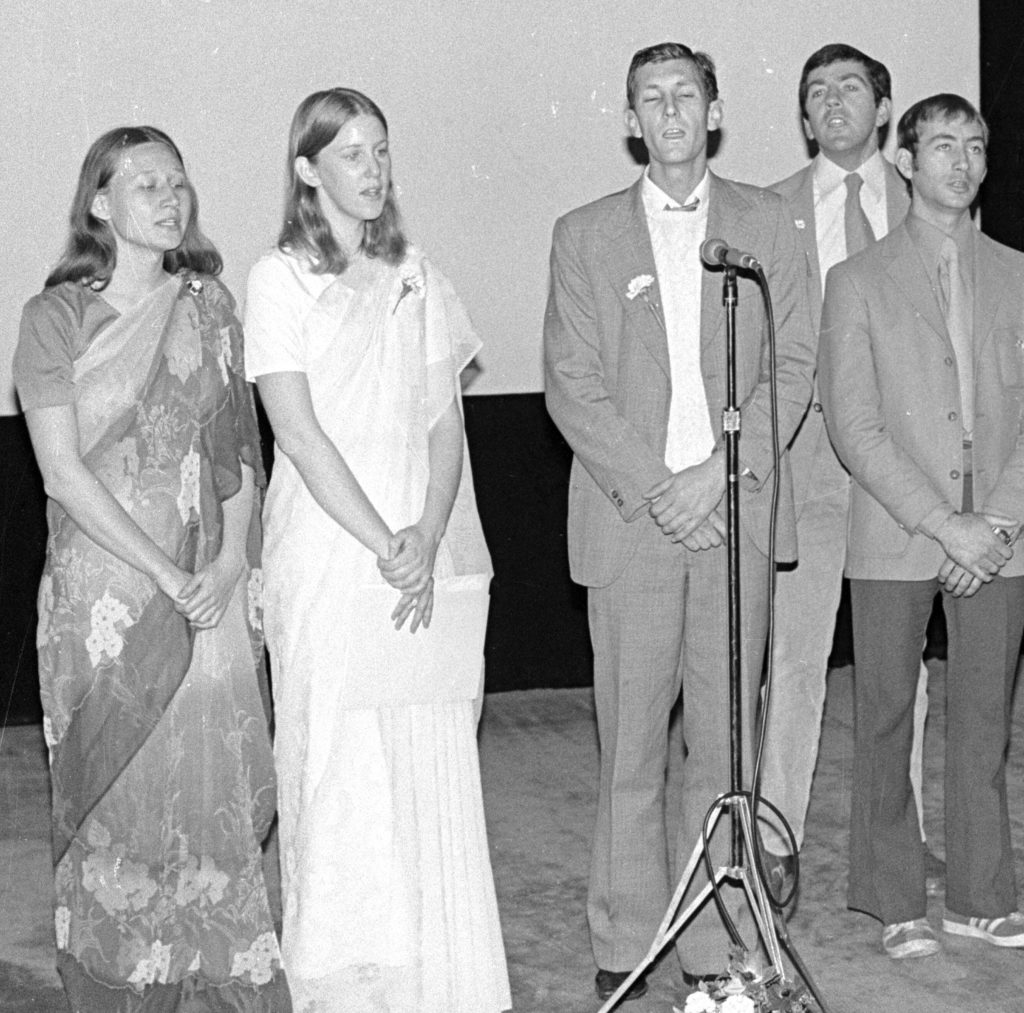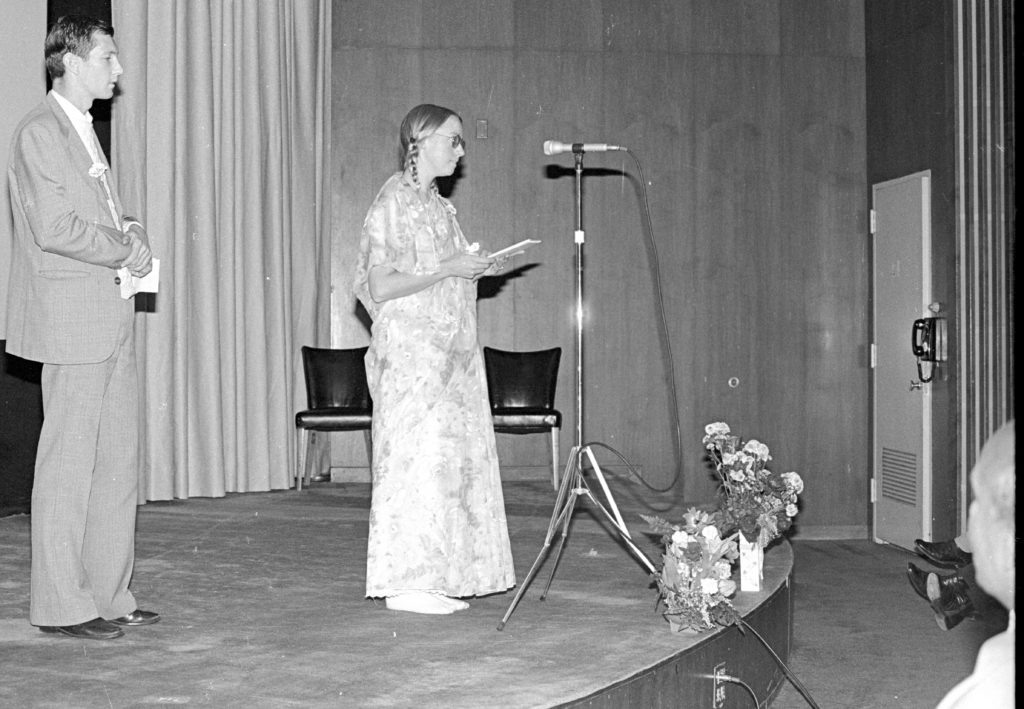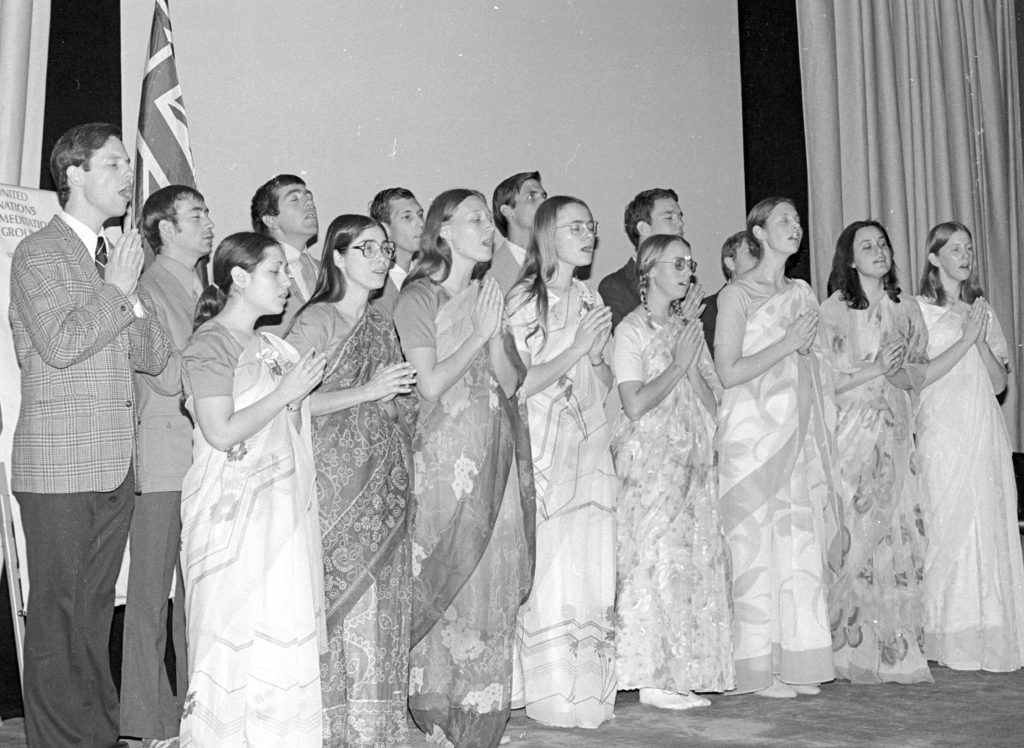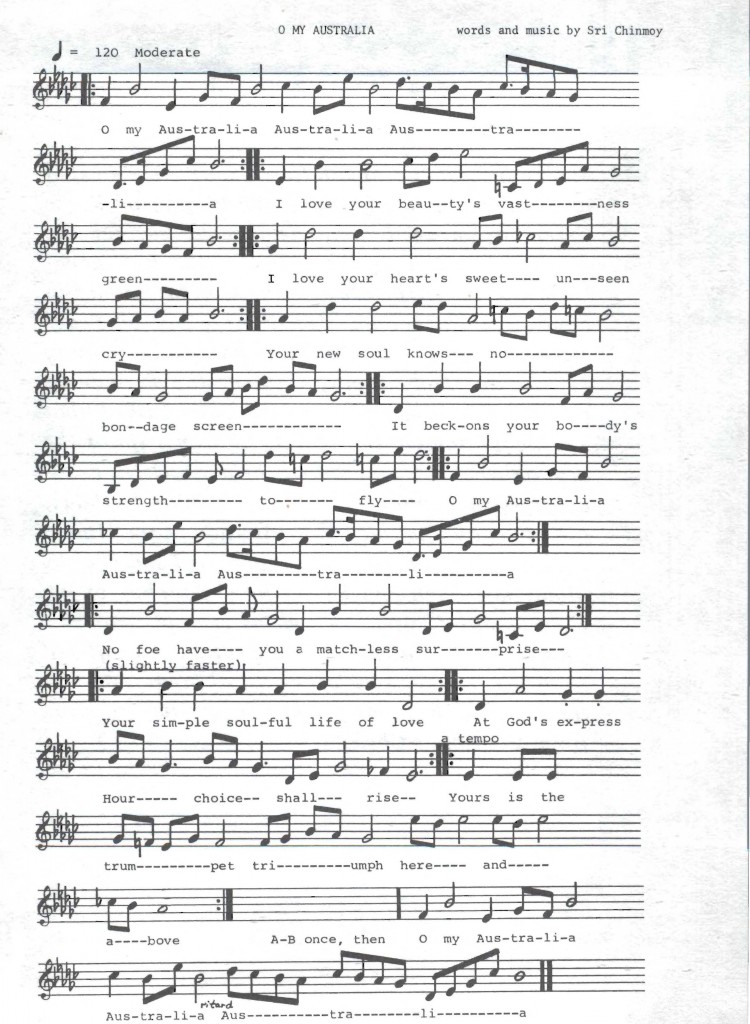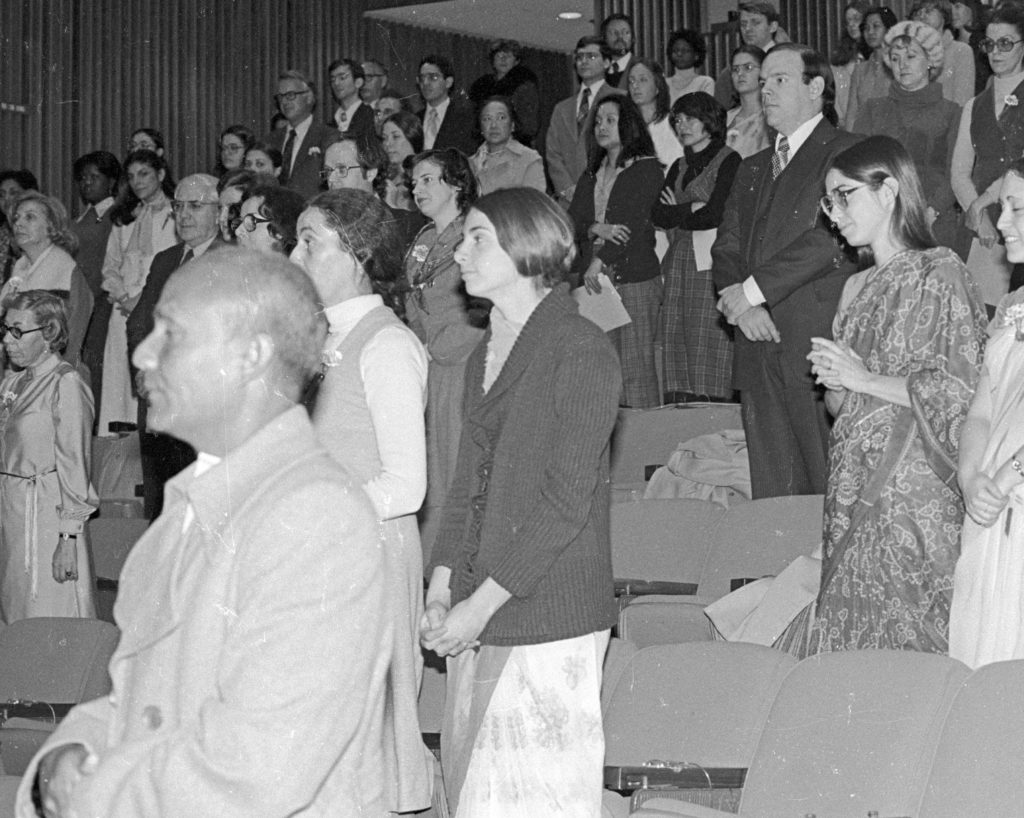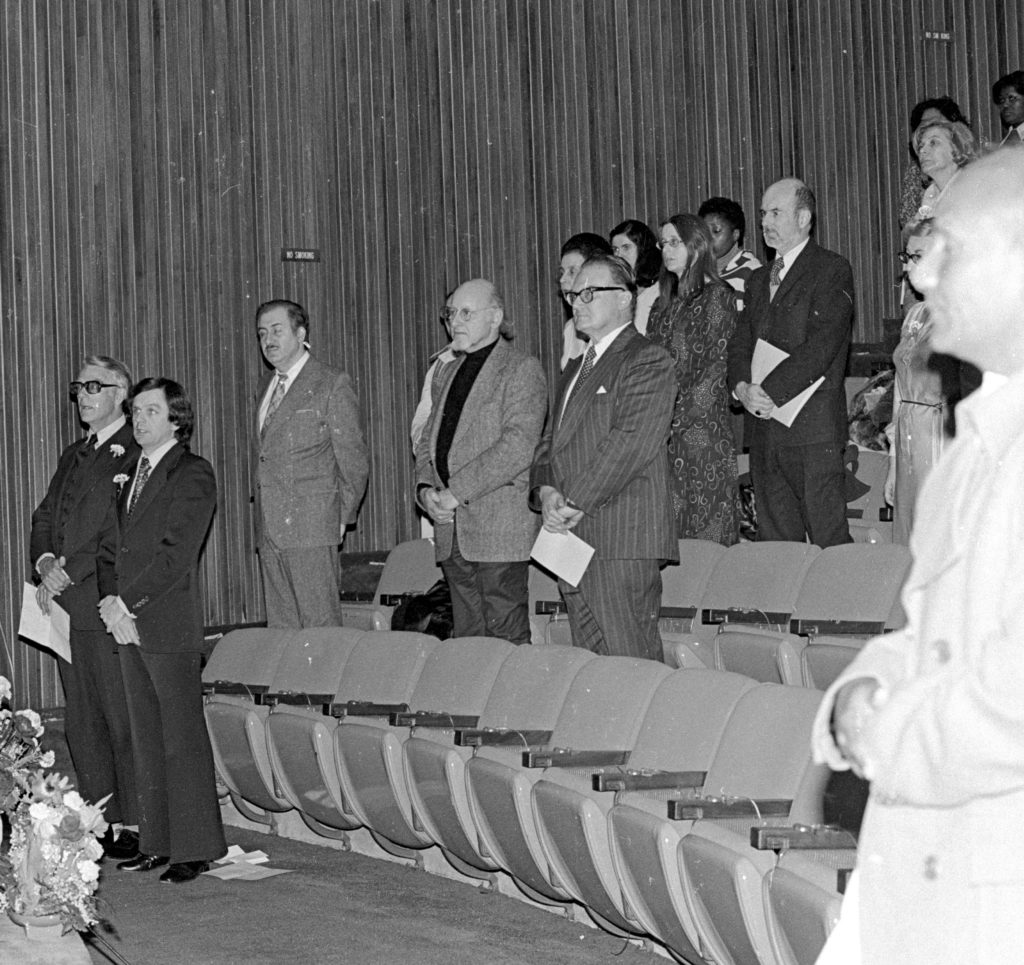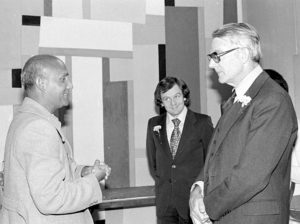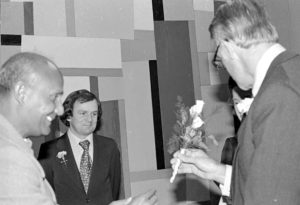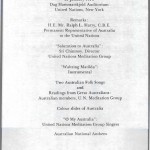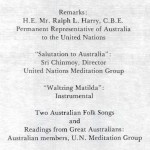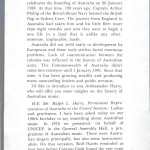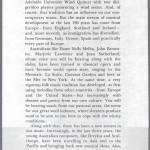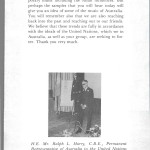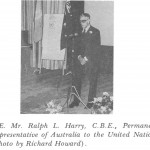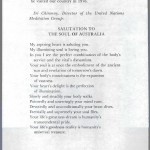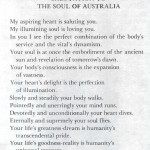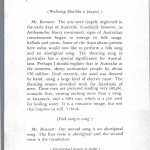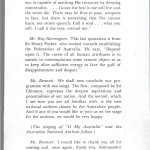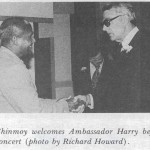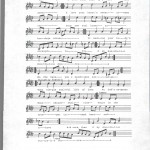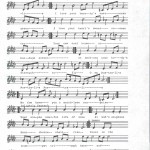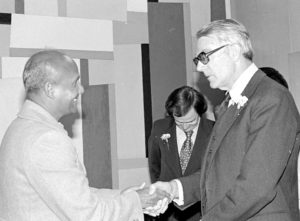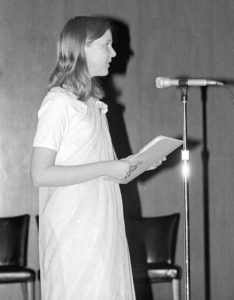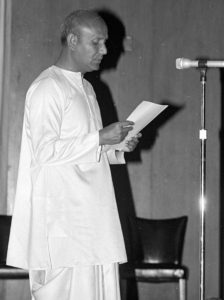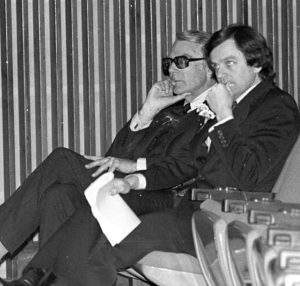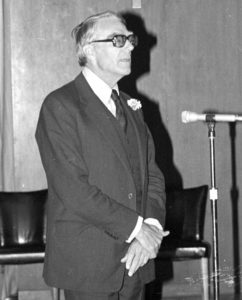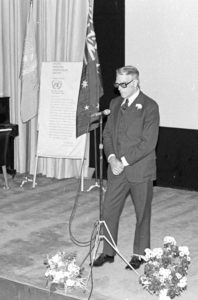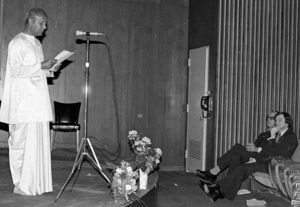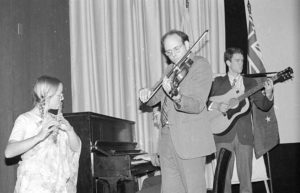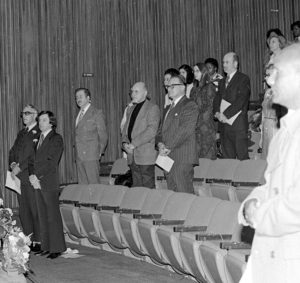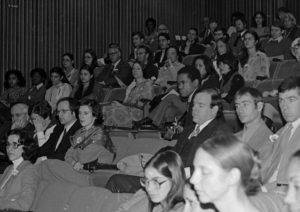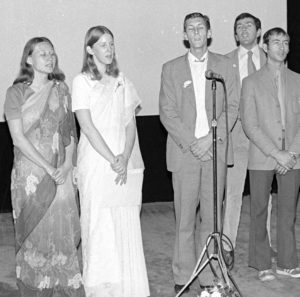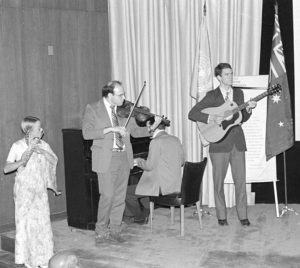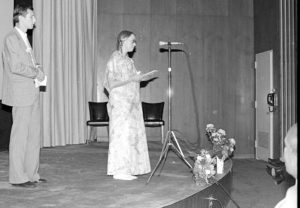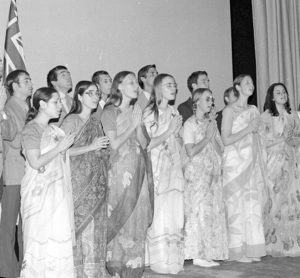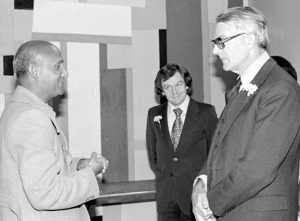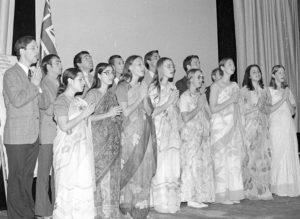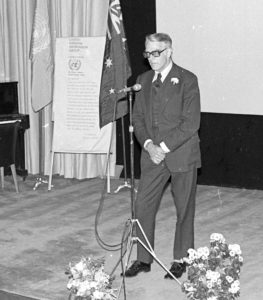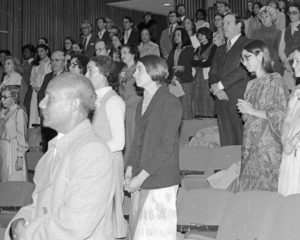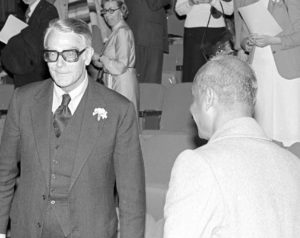Honour Australia’s Day, 27 Jan 1978: DETAILS
Filed under asia-oceana | Music and Songs | Tributes and Expressions of appreciationOn 27 January 1978 the Meditation Group hosted a programme marking the anniversary of Australia’s admission to the United Nations, which also coincided with Australia’s National Day. Ambassador Ralph L. Harry of Australia spoke, and members of the Group performed traditional Australian folk songs as well as Aboriginal music.
For summary of progrramme and excerpt from Ambassador Harry’s talk. go to 1978/01/27/programme-in-honour-of-australias-foundation-day/
This page (below) has more details and photos from the Programme
PROGRAMME IN HONOUR OF AUSTRALIA’S FOUNDATION DAY
– 27 January 1978m, Dag Hammarskjold Auditorium, United Nations, New York
Remarks:
H.E. Mr. Ralph L. Harry , C.B.E. Permanent Representative of Australia to the United Nations
“Salutation to Australia”: Sri Chinmoy, Leader of Peace Meditation at the UN
“Waltzing Matilda”: Instrumental
Two Australian Folk Songs and Readings from Great Australians:
Australian members, Meditation Group
Colour slides of Australia
“O My Australia”: Meditation Group Singers
Australian National Anthem
Sri Chinmoy welcomes Ambassador Harry before
the concert (Photo by Richard Howard) .
Ms. Meredi Bennett: Firstly, I’d like to welcome you all here, particularly Australia’s Permanent Representative to the United Nations, Mr. Ralph Harry, Mrs. Harry and Mr. Geoff Dixon from the Australian Consulate .
Today’s programme celebrates the founding of Australia on 26 January 1788. At that time, 190 years ago, Captain Arthur
Phillip of the British Royal Navy hoisted the British flag in Sydney Cove. The journey from England to Australia had taken him and his little fleet more than eight months and now they were to begin a new life in a land that is unlike any other: immense, implacable, harsh.
Australia did not yield easily to development by
Europeans and these early settlers faced enormous
problems. Lack of communication between the
colonies was reflected in the history of Australian
unity. The Commonwealth of Australia didn’t
come into existence until 1 January 1901. Since that
time, it has been growing steadily and producing
many outstanding leaders and public servants.
I’d like to introduce to you Ambassador Harry,
who will offer you some insights on the history of
Australian music.
H. E. Mr. Ralph L. Harry, Permanent Representative
of Australia to the United Nations:
Ladies and gentlemen, I have been asked today on our
190th birthday to say something about Australian
music. In 1976 we presented, on behalf of
UNICEF, in the General Assembly Hall , a programme
of Australian music. There were Australian
singers principally, but also some instrumentalists.
On that occasion, Rolf Harris reminded us
that long before Captain Cook found the east coast
of Australia and long before Europeans came to
Australia, the Australian people had developed a
most interesting music for their rituals and for their
life in general, and that Australian aboriginal
music is still alive today.
H.E. Mr. Ralph L. Harry, C.B.E. , Permanent Representative of Australia to the United Nations (photo by Richard Howard)
I heard a few years ago here in New York the
Adelaide University Wind Quin tet with two didgeridoo
players presenting a wind sextet. And, of
course, that tradition has an influence on our contemporary
music . But the main stream of musical
development in the last 190 years has come from
Europe-from England, Scotland and Irelandand,
more recently, as immigr ation has diversified,
from Germany, Italy, Greece, Spain and practically
every part of Europe.
Australians like Dame Nelly Melb a, John Brownlee,
Marjorie Lawrence and Joan Sutherland,
whose voice you will be hearing along with the
slides, have been trained in classical opera and
have become world opera stars, singing in the
Monnaie, La Scala, Convent Garden and here at
the Met in New York. At the same time, a very
vigorous folk music tradi tion has developed, at first
using melodies from other countries – from Europe
and the United States-but increasingly with
themes and poetry from our own culture. You will
be hearing music from our pastoral areas, the scene
for our great wool industry, where shearers produce
wool to be sent to you here to cope with the wintry
conditions.
Along with that, there has been a new stream in
our music. Increasingly, in the last thirty years, the
young Australian composers, like Dreyfus and Sculthorpe,
have been travelling to Asia and to the
Pacific and bringing back new musical ideas. Also,
they have been receiving in Australia musicians
from our neighbouring countries and drafting their
ideas and concepts into Australian compositions,
thus forming a bridge between our people and the
peoples of Asia and the Pacific.
I’m sorry that today you will be hearing neither
the music of our aboriginal people nor contemporary
music including the Asian influences. But
perhaps the samples that you will hear today will
give you an idea of some of the music of Australia.
You will remember also that we are also reaching
back into the past and reaching out to our friends.
We believe that these trends are fully in accordance
with the ideals of the United Nations, which we in
Australia, as well as your group , are seeking to foster.
Thank you very much.
Ms. Bennett: T hank you, Ambassador Harry. I would n ow like to invite Sri Chinmoy, the Leader of the Meditation Group, to read a
tribute that he wrote to the soul of Australia when he visited our country in 1976.
Sri Chinmoy, Leader of the Peace Meditation Group at the United Nations
SALUTATION TO THE SOUL OF AUSTRALIA
My aspiring heart is saluting you .
My illumining soul is loving you.
In you I see the perfect combination of the body’s
service and the vital’s dynamism.
Your soul is at once the embodiment of the ancient
sun and revelation of tomorrow’s dawn.
Your body’s consciousness is the expansion
of vastness.
Your heart’s delight is the perfection
of illumination .
Slowly and steadily your body walks.
Pointedly and unerringly your mind runs.
Devotedly and unconditionally your heart dives.
Eternally and supremely your soul fl ies.
Your life’s greatness-dream is humanity’s
transcendental pride.
Your life’s goodness-reality is humanity’s
universal treasure.
Ms. Bennett : We shall now begin the musical section of our programme. Undoubtedly the best known Australian song is Waltzing Matilda, and the members of the Meditation Group shall now perform an instrumental version of it.
(Waltzing Matilda is played. )
Ms. Bennett: The arts were largely neglected in the early days of Australia. Gradually however, as Ambassador Harry mentioned, signs of Australian consciousness began to emerge in folk songs, ballads and yarns. Some of the Australians present here today would now like to perform a folk song and an aboriginal song. The shearing song in particular has a special significance for Australians.
Perhaps I should explain that in Australia at the moment, sheep outnumber people by about 170 million. Until recently, the wool was sheared by hand, using a large kind of electric razor. The shearing season provided work for hundreds of men. These men are pictured leading very simple, nomadic lives, owning nothing more than a swag, or knapsack , and a billy can , which is a pot used
for boiling water. It is a romantic image , but one that inspires us still , I think.
(Folk song is sung.)
Ms. Bennett: Our second song is an aboriginal
song. The first verse is aboriginal and the second
verse is the translation .
(Aboriginal music is sung.)
Ms. Bennett : We will now have a selection of
slides of Australia which have been kindly provided
by the Australian Information Service and Sri
Chinmoy, who visited five capital ci ties during his
tour. The voice you will hear behind the slides is
that of Joan Sutherland , the world-renowned opera
singer.
(Slides and music follow.)
Ms. Bennett: We would like to include m our
programme at this stage a selection of quotations
from three great Australians. Before we do so, I
would like to mention another Australian who has
a unique place not only in Australia’s history but in
the history of the United Nations. It is Dr. Herbert
Evatt who, in 1948, became the first English-speaking
President of the General Assembly. In 1945,
three years earlier, at the San Francisco Conference,
he had proposed more amendments to the
Charter than any other delegate and had earned
himself the title “Champion of the small nations”.
The great Australians we shall mention now are
Dame Nelly Melba, Alfred Deakin and Sir Henry
Parkes.
Mr. Ray Harrington: This first quotation is from
Alfred Deakin, who was a great Australian statesman
and political figure around the turn of the
century. From his poetry : “My keenest hunger is
not that of the body but of the soul , a hunger for
the true and beautiful, that these may be the lifeblood
of my soul.”
Ms. Sally Goleman : The quote I would like to
read is from Dame Nelly Melba, who is considered
one of the first great Australian singers and
probably one of the greatest prima donnas that the
world has ever known. “I always instinctively
believed in life after death. 1 cannot believe that
God, who painted the rose, hung the stars in the
summer night, and breathed eternal music into the
sea, is capable of mocking His creatures by denying
immortality .. .. 1 know the best in me will live and
the worst die. There may be fires to pass, tempests
to face, but there is something that fire cannot
burn, nor storm quench. Call it soul .. . what you
will. 1 call it the true, eternal me.”
Mr. Ray Harrington: This last quotation is from
Sir Henry Parkes, who worked towards establishing
the Federation of Australia. He says, “Depend
upon it. The rarest of all human attributes is to
sustain in contemplation some remote object so as
to keep alive sufficient energy to face the gulf of
disappointment and despair.”
Ms. Bennett : We shall now conclude our programme
with two songs. The first, composed by Sri
Chinmoy, expresses the deepest aspirations and
potentialities of our nation. And the second, which
1 am sure you are all familiar with, is the new
national anthem chosen by the Australian people.
And if any of you would like to join us on the stage
for the anthem, we would be very happy.
(The singing of “0 My Australia” and the Australian National Anthem follow.)
The audience stands for the singing of the Australian national anthem
(Photo by Richard Howard) .
Ms. Bennett: 1 would like to thank you all for coming and, once again, thank you , Ambassador and Mrs. Harry.
pdf of programme report:
bu-scpmaun-1978-01-27-vol-06-n-01-jan-pp-34-43-australia-day
Gallery 1:
Gallery 2:
- (c) Copyrights Sri Chinmoy Centre
- (c) Copyrights Sri Chinmoy Centre
- (c) Copyrights Sri Chinmoy Centre
- (c) Copyrights Sri Chinmoy Centre
- (c) Copyrights Sri Chinmoy Centre
- (c) Copyrights Sri Chinmoy Centre
- (c) Copyrights Sri Chinmoy Centre
- (c) Copyrights Sri Chinmoy Centre
- (c) Copyrights Sri Chinmoy Centre
- (c) Copyrights Sri Chinmoy Centre
- (c) Copyrights Sri Chinmoy Centre
- (c) Copyrights Sri Chinmoy Centre
- (c) Copyrights Sri Chinmoy Centre
- (c) Copyrights Sri Chinmoy Centre
- (c) Copyrights Sri Chinmoy Centre
- 1978-01-27-08-Amb-Harrry-with-Sri-Chinmoy.j
- (c) Copyrights Sri Chinmoy Centre
- (c) Copyrights Sri Chinmoy Centre
- 1978-01-27-08-sri-chinmoy-amb-Harry-chat
- (c) Copyrights Sri Chinmoy Centre
- (c) Copyrights Sri Chinmoy Centre
